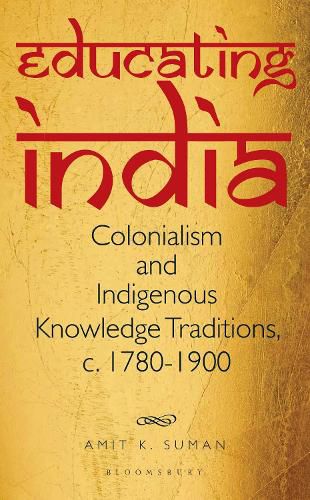Readings Newsletter
Become a Readings Member to make your shopping experience even easier.
Sign in or sign up for free!
You’re not far away from qualifying for FREE standard shipping within Australia
You’ve qualified for FREE standard shipping within Australia
The cart is loading…






The book delves into the educational challenges that indigenous groups faced during the late 18th and 19th centuries and examines how they responded to these challenges and threats.
It centres on the historical evolution of education in the Bengal Presidency and the North-Western Provinces, with a particular emphasis on the roles of pandits, maulvis, and other influential figures within indigenous society.
Up until the 19th century, questions about the nature of knowledge, the most effective methods of transmitting it, and the societal responsibilities toward educating the youth were not monopolized by any single entity. In most of Europe, private actors, rather than the state, assumed the role of the dominant authority controlling the definition and dissemination of knowledge. This trend gradually marginalized local knowledge and traditional ways of life. In contrast, the colonial state in India did not encourage "local agencies" to actively participate in the process of knowledge formation. Instead, under colonialism, indigenous institutions and educators became agents of the state. It's important to clarify the term "indigenous" in this context. Here, it refers to all educational institutions that served the local population, taught pre-British curricula, were staffed by Indian or native teachers, and initially received patronage from local elites. However, over time, colonial authorities began providing funding and assuming patronage of these institutions, which subsequently led to changes in their structures.
$9.00 standard shipping within Australia
FREE standard shipping within Australia for orders over $100.00
Express & International shipping calculated at checkout
Stock availability can be subject to change without notice. We recommend calling the shop or contacting our online team to check availability of low stock items. Please see our Shopping Online page for more details.
The book delves into the educational challenges that indigenous groups faced during the late 18th and 19th centuries and examines how they responded to these challenges and threats.
It centres on the historical evolution of education in the Bengal Presidency and the North-Western Provinces, with a particular emphasis on the roles of pandits, maulvis, and other influential figures within indigenous society.
Up until the 19th century, questions about the nature of knowledge, the most effective methods of transmitting it, and the societal responsibilities toward educating the youth were not monopolized by any single entity. In most of Europe, private actors, rather than the state, assumed the role of the dominant authority controlling the definition and dissemination of knowledge. This trend gradually marginalized local knowledge and traditional ways of life. In contrast, the colonial state in India did not encourage "local agencies" to actively participate in the process of knowledge formation. Instead, under colonialism, indigenous institutions and educators became agents of the state. It's important to clarify the term "indigenous" in this context. Here, it refers to all educational institutions that served the local population, taught pre-British curricula, were staffed by Indian or native teachers, and initially received patronage from local elites. However, over time, colonial authorities began providing funding and assuming patronage of these institutions, which subsequently led to changes in their structures.